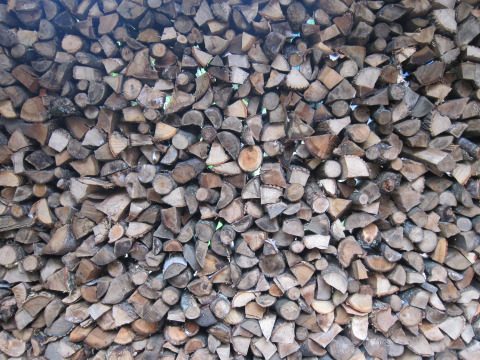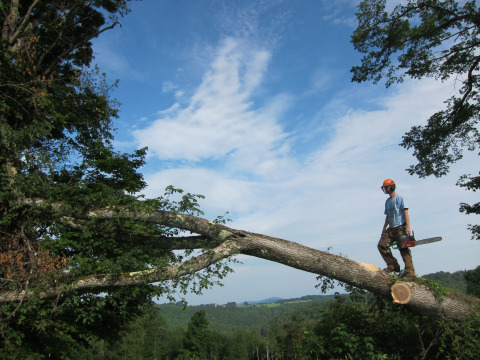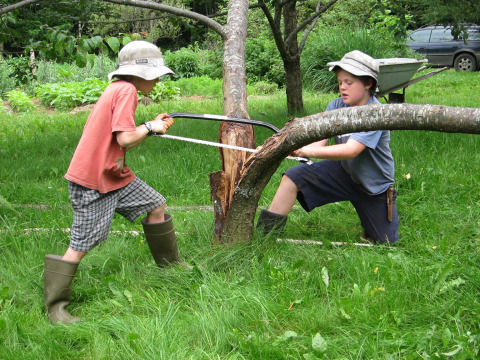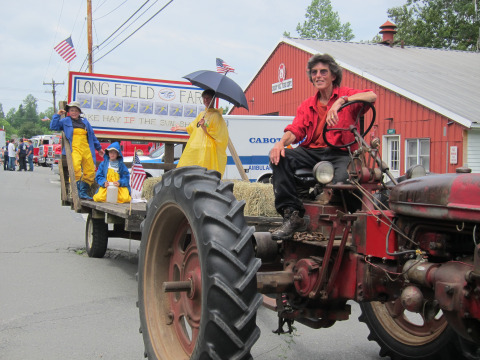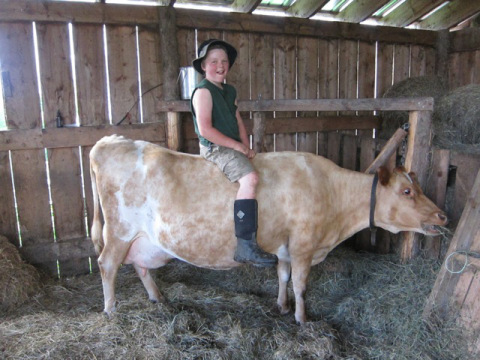Ben Hewitt's Blog, page 65
July 12, 2013
The Freedom of Staying

Fleshing a woodchuck hide
After the reading last night, the issue of travel came up again. And by “again,” I’m referencing a comment from Wednesday’s post: My question for you is this-don’t you ever want to travel? To see the rest of the world? New Zealand, Fäviken in Sweden, walk through Italy? Or are you THAT freakin content?! Or I am NOT?
It’s true. We don’t travel much. And by “much,” I mean “at all.” Or darn close to it: Back in ’07 (I think it was, but honestly I can’t remember for certain; mighta been ’06) we did manage to find some poor saps to housesit. “You can use 3 kilowatt hours per day. Unless it’s cloudy. Then, you can’t use any. Don’t let the batteries run low. If it snows, sweep the solar panels before you plow the 1/4-mile driveway. When the cows escape, make sure they don’t get to the main road. There’s no backup heat, so you can’t leave for more than three hours at a time. The plow truck will probably break down at least once while we’re gone; likewise, the tractor. We will be unreachable most of the time. Have fun.”
Anyway. 2007 is the last time we left this property for more than a single night as a family. We had a grand ole time, even if the 7 weeks we spent traipsing around Florida’s state park system coincided with the coldest winter they’d seen in something like 12,000 years. The week we spent in the Everglades, fish were dying from the cold. No kidding. We spent most of our time huddled and shivering on the bed I’d built into the old Dodge van we’d bought off Craigslist expressly for the trip.
As I explained last night (and as I’ve alluded to in this space before), it often feels to me as if we’ve made an exchange. Which is to say, we’ve exchanged the freedom for easy and frequent travel for a different sort of freedom. The different sort of freedom I’m talking about is not quite so easy to explain, and to be honest, I’m not even sure I’ll do that good a job of it. But that’s never stopped me from trying before, and it sure as heck ain’t gonna stop me now.
The freedom I’m talking about comes from connection to a particular place. It comes of spending one’s days immersed in that place, in its nooks and crannies, hollows and swells, woods and fields. It comes of waking every morning – or most mornings, at least – with a sense of anticipation for what the day holds, for all the small tasks and moments that await. It comes of walking down to the cows in the hesitant light of almost dawn. It comes of knowing where the chanterelle mushrooms are emerging from the forest floor (and holy jeez are they poppin’ this year), of following a fresh set of moose tracks with your 8 year old son until you feel like not following them, of returning from morning chores with your hatful of mushrooms and a quartet of fresh eggs and setting them on the ground, stripping down to your birthday suit, and cannonballing into the pond.
This freedom comes of ritual and routine, not in service to the contrived arrangements of the so-called economy, but in accordance with nature’s cycles and forces: Buck the wood, split the wood, stack the wood, burn the wood. Mow the hay, ted the hay, rake the hay, bale the hay. Plant the seed, water the seed, tend the seedling, transplant the seedling, eat the tomato.
This freedom comes from knowing that while it is true that we can’t afford to travel, there is much we can afford: To eat three meals together as a family almost every day. To help a neighbor in a bind. To step away from my desk to go fishing with the kids, or spend an hour in the garden with Penny.
This freedom comes from having time to invest in honing our current skills and learning new ones. It is found in innumerable barnyard chats (how many? A hundred? Hundreds? Probably not a thousand. Or not yet, at least) I’ve had over the years with Jimmy or Melvin, 10 or 15 or 20 minutes taken in the middle of the day for no other reason, perhaps, than we can. There’s no one to tell us our time should be spent otherwise.
To return, briefly, to the original question: Don’t you ever want to travel? The only honest answer is “yes.” There are times we do want to travel. Absolutely. And maybe someday, we will.
But for now, we want what we have even more. It’s the freedom of living, as much as possible, in accordance with our beliefs. It’s the freedom of commitment to a place, to our family, and to our time.
I guess if I had to sum it up, it’s the freedom not of traveling, but of staying.

July 10, 2013
This Week
I’ll be at Pheonix Books in Burlington on Thursday. 7:00
And in Ludlow, at the farmer’s market (in association with the Book Nook) on Friday. 5:00
Hope to see some of ya’ll.

July 9, 2013
Trapped

One less ‘chuck
The boys have been trapping woodchucks left and right. I think they’re up to six between them, though it might even be seven or eight. Each of these has been snagged in a number 1.5 leghold trap, before being dispatched with a .22 rifle. Each has been skinned and dressed while hanging from a tree branch. The hides are being processed with an eye toward a pair of furred ammo pouches; the meat has been either stewed on the bone and made into chili, or frozen for future consumption.
The truth of it is, it’s all a little horrifying to Penny and me. It’s not the killing of animals we mind (and how could we? We kill more than our fair share, ourselves); it’s the trapping that gets us. Fin and Rye check their traps multiple times each day, but not throughout the night, and the possibility exists that any of these chucks spent multiple hours struggling against the unyielding metal jaws that, unbeknownst to them, had sealed their fate in the fraction of a second it took for them to close around the foreleg.
Our sons have been interested in trapping for many years, now. I’m not sure where it came from; perhaps it is merely a natural extension of their having been immersed in the visceral reality of life and death on a farm. For years now, whenever we’ve slaughtered pigs, the boys have kindled a fire, over which they’ve roasted bits of meat carved from the hanging carcass and slices of still-warm liver, heart, and kidney they’ve pulled from the cavity where the mechanics of life are contained. Their awareness of meat and all it entails is approximately as unclouded as it possibly could be.
About a year ago, after a couple years of thwarting and arguing against their desire to trap, after they’d practically worn through the pages of every piece of printed material pertaining to the subject they could find, Penny and I sought to find a mentor who could guide them through the process with as much reverence as possible. That is how we met Nate, who has spent a fair bit of time trapping with the Cree in Northern Quebec and on his own in these parts. Nate does not trap for money; nor does he trap to hang pelts on his wall, or because he thinks it would be “cool” to have a bobcat fur. He turns the coats of the animals he traps into clothing he actually wears, and he fills his stomach with their flesh and organs. In other words, the animals he traps become him.

Dressing and skinning a woodchuck
Observing my sons’ relationships to animals is fascinating to me. I see that they have the capacity in their heads and hearts to be both calculating and perhaps even cruel, even as they are so often incredibly loving and devoted to the creatures dependent on their care. Not long ago, Rye and Penny happened upon a hawk dining on one of his favorite laying hens (of the nearly two dozen we have), and he burst into tears. Both boys are forever stroking and touching the cows, or lolling about with the goats. They catch small wood frogs and hold them in the hollow of their palm, studying them intently, before setting them gently onto the forest floor.
And then they set their traps.
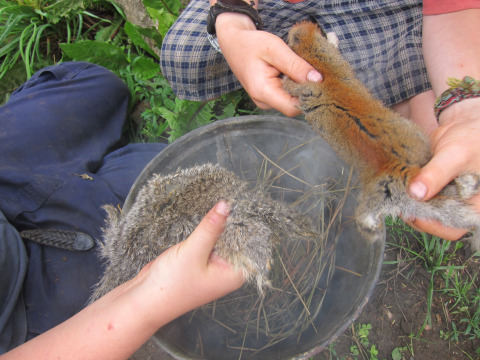
Smoking squirrel hides
I am sure that some of you will find it horrifying that we allow the boys to trap and kill wild animals. I offer no defense of our decision to allow our children to find their own way with the creatures of their world. In truth, I would rather they did not wish to trap, although I am glad to know we’ll likely have plentiful corn on the cob this summer, after a few summers of sharing much of the crop with the local community of woodchucks. I would rather they did not wish to trap, but since they do, I am grateful they have someone in their lives who is teaching them that such actions are not to be taken lightly, and that anything less than complete utilization of the animal in a manner that actually absorbs it into their very being is unacceptable.
The human relationship with animals has shifted dramatically in only a handful of decades. For most Americans in the early 21st century, animals are either embodied as pets, shrink wrapped in cellophane, or relegated to the page and screen. Frankly, I do not think this is healthy for either us or the creatures with which we share – however stingily – our world. In a way, I think this disconnect from animals – both wild and domestic – is far more disrespectful than my sons’ trapping. Because of course we are all responsible for the death of innumerable creatures; we are all party to an industrialized economy that spoils land and waterways, that paves over large swaths of land, that destroys habitat by thousands of acres each and every day. In this manner, most of us do our killing from a distance.
So while I do wish the boys weren’t interested in trapping, I’m tremendously grateful for their desire to immerse themselves in the lives and deaths of animals around them, and I admire their devotion to the process. I won’t go so far as to say the world is a better place for it, although I’m pretty sure their world is. The woodchucks, I suspect, think somewhat differently.

July 8, 2013
All Wood, All the Time
Pretty much the whole cottonpickin’ weekend was wood. On Friday (not really the weekend, but what the heck), we stacked wood we’d split over the winter. This meant we were stacking about five weeks past my self-imposed deadline to have all wood stacked and under cover, but since we usually stack at least eight weeks past this deadline, we were, to my convoluted way of thinking, actually three weeks ahead of schedule. If any of you think this makes any sense at all, well… we’d probably get along real good.
On Saturday, we stacked more wood and I split the last half-cord or so of cookstove wood we’ll need to get through until next June. Or whenever the heck it decides to warm up around here. We generally burn more wood in the cookstove than in the heating stove, in part because we actually cook on the darn thing, in part because it provides a goodly portion of our hot water via a loop in the firebox, and in part because there are an awful lot of days when the cookstove provides all the heat we need to keep the toilet water from freezing. And really, who could ask for anything more?
On Sunday, we tackled the big elm that blew down last year along the fence line between our land and Melvin’s. It was tough to see that tree go; it was one of the few remaining giant elms in town, with three boles, each in the 2-foot range. One is still standing, but I don’t have high hopes for it. The one we bucked on Sunday was hung up in a neighboring sugar maple in such a manner that I had to clamber up to trim limbs and whatnot, and this had the delightful side effect of making me feel much more rugged and capable than I actually am. Plus, it was kind of fun.
On Sunday afternoon, the boys and I went and visited Ross and Diane, who live up in Craftsbury, a lazy 30-minute drive to the north. Not unlike so many of the small events of my life that I later come to understand were not actually all that small at all, this had come about in a strangely serendipitous manner, as if it had somehow been preordained. In short, Nate had called Ross a while back to inquire as to whether he might know where to procure a quantity and quality of birch bark suitable for the making of a canoe (Ross is a forester and thus privy to such knowledge); while he was talking with Ross, Nate happened to mention he’d been hanging out with a couple of young rapscallions who were enamored of the wild and Ross mentioned back that he had a couple of nice old axe heads (it’s safe to say that Ross is something of an axe fanatic) he was keen to pass along to a couple of young ‘uns.
Now, as it turns out, and as it was slowly revealed through further contact, Ross and Diane are actually old friends of my parents’, from way back when. I mean, I’m talking 35, 40, maybe even 45 years ago, back when humans and dinosaurs battled for global supremacy on a daily basis. We spent a good hour at their place, ogling Ross’s axes, and chatting and whatnot, and the boys left with not only the axe heads, but a small axe that Ross had refinished and fitted with a handle of his making, as well as a drawknife, something the boys have been pining after for many moons. It was an enormous show of generosity, of the sort that can only come from one who feels a deep and abiding connection to the people and place around him.
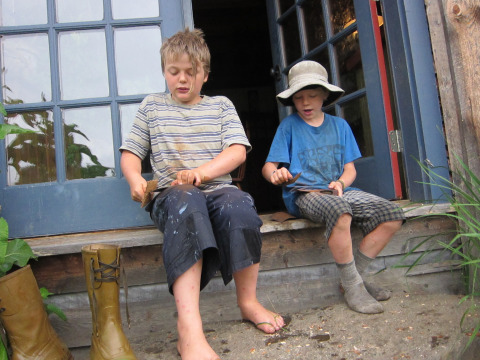
Cleaning up the axe heads
On the drive home, Fin and Rye held their respective axe heads in their laps. Every time I looked in the rearview mirror, they were gazing down at the heads, and although Penny and I try our damnedest to imbue them with the sense that not one iota of their emotional well-being is dependent on owning any particular material object, I couldn’t help but take some pleasure in how completely these small pieces of rusted metal – older than them by decades, if not centuries – had captured their imaginations.
Stoves. Axes. Trees. Wood. I am struck by how prominently these things figure in our lives. And how fortunate I am to have this be so.

July 5, 2013
Frogs Over Fireworks
For those of you not from around here, you should know that Cabot’s July 4th parade is kind of a big deal. I can’t say for sure how many people were crowded along Main St yesterday, but it had to have been pushing a couple thousand. There are puppets and pageantry (Bread & Puppet always makes an appearance), fire engines and tractors, dancing and dirt bikes. The boys were invited to ride on Lynn and Martha’s float, titled “Make Hay IF the Sun Shines.” They dressed in head-to-toe rain gear and armed themselves with squirt guns they’d cobbled together out of syringes, electrical tape, and cast-off pieces of wood. Believe it or not, the damn things shoot water better than any store bought (or as the boys are fond of saying, “boughten”) squirt gun I’ve ever seen, and the fellas were in their element, having been granted permission to spray at will.
Later in the day, we had some friends over for burgers and beers and Jason’s phenomenal potato salad and whatnot, and we cooked down by the pond until it started raining in earnest, at which point we retreated to the house. It had the look of a settled storm, but at 7, the clouds parted and those who remained sashayed back down to the pond and we swum and talked until dark, swatting blood-fat mosquitos and hearing the boys’ goats snicker and shuffle as they bedded down for the night
At 8:30 or so, just as it was beginning to look as if dark would finally prevail, the tree frogs started singing, and for the next half-hour or so, we were serenaded by amphibians. Then the booming reverberations of the neighboring towns’ fireworks show began, and the singing stopped.
Ya know what? I’ll take frogs over fireworks any day of the year.

July 3, 2013
The Great Thing About Trees
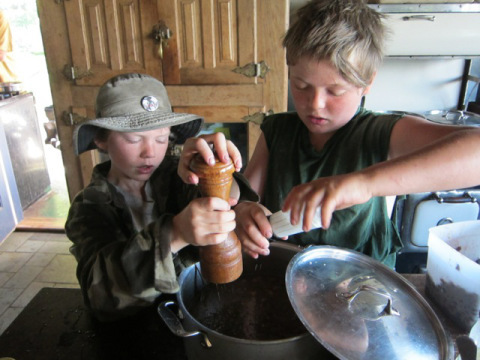
The boys making (surprisingly tasty) woodchuck chili
Once again we awoke to the sound of rain slapping the metal roof over our heads. There are many things a tin roof is good for – shedding snow, being cheap and easy to install, longevity – but none compare to its excellence in transmitting the sound of raindrops upon contact. I pity a fool with asphalt shingles, yes I do.
The rain has been incessant. Everywhere you go, first cut remains standing; perhaps not all of it (and holy jeez but we were fortunate to get ours off the ground when we did), but plenty enough, growing taller and stemier and less palatable by the minute. It’s a full month past when most farmers prefer to be finished with first cut, in part because the nutritional content is vastly superior before so much precious plant energy is expended in the seed head, but also because there’s a fairly simple rule of haying, which says that you can’t take second cut until you’ve taken first cut, and you darn well can’t take third until you’ve taken second. In other words, it’s not only that the first cutting will be of reduced quality, it’s that there will be less time for second and third cuts to rise from the soil.
But whatever. I have little patience for lament regarding forces over which we have no control, and the same could be said of the majority of the famers I know, whose very livelihood is dependent on such forces in ways that mine is not. I do not hear complaints from these men and women; commentary, sure, perhaps a sigh, a roll of the eyes, a shrug of the shoulders. But not complaints. Complaining takes energy; it is a brittle and hollowing force, not unlike anger or judgement. It does nothing to forward the human intellect and spirit, and therefore it is best saved for moments that are truly worth inflicting these wounds upon ourselves, such as when the boys track mud into the house or leave spent shotgun shells on the ground.
All this rain has reminded us how fortunate we are to inhabit a piece of land that drains well. Despite the sodden state of things, the gardens are (mostly) looking hale and hearty, and the critters are their usual implacable selves; I’ve long thought that cows might be a better model for human behavior than the majority of our so-called leaders. They’re just so accepting of whatever is offered them, and their default mood seems to be one of quiet contentment. Nip the grass, chew the cud, rest the bones, and all the while the generosity of milk, meat, and manure. Cows don’t start wars, or discriminate against cows of different color or predilections. And get this: With just a modicum of management, they actually improve the soil and environment. If only we could say the same about ourselves.
Soon enough, it’ll stop raining. Soon enough, I suspect, everyone’ll be talking about how dry it is, about how we sure could use a day or two of rain or we’re not even going to get a third cut at all. And the cows? They’ll be gathered under the same fence line maples they gathered under back when it wouldn’t stop raining. Because that’s the great thing about trees: Rain, sun, snow, whatever. They’ll shelter you no matter what.

July 2, 2013
Saddle Up
Over the past few weeks, a number of folks have expressed surprise that I was so candid about my family’s finances in the pages of $AVED. To be honest, I don’t see as I had much choice in the matter: How could I expect readers to trust in my story without such candor? Specifically, how could I expect readers to trust my contention that money is not a particularly sound emblem of wealth unless it was clear that I trusted that contention myself? True, the fact that my family lives on about $3ok/year is not proof of that trust, but it is at least indicative of it. It’s at least evidence – perhaps not definitive evidence, but evidence nonetheless – that’s I’m not a complete hypocrite.
And there’s this: I find it totally baffling that money has become such a taboo subject in our society. Given the universality of its role in our lives, and given the incredible power it holds over us, wouldn’t you think we’d want to talk about it? And not merely in generic terms, but in specifics? Aren’t you curious how other people manage their finances? How much they make, and how they budget? Aren’t you curious about their relationship to money, whether they feel suffocated by money, or liberated by it?
Actually, I think people do want to talk about these things; they’re just not always sure how. What I’ve found is that most people, when given the opportunity, are glad, if not grateful, to talk about money. Interestingly, this seems particularly true of the working class, who, from my limited experience, don’t seem nearly as reticent as upper income classes to discuss the specifics of income and expenditures and so on. Or maybe I think this simply because the vast majority of the people I consort with are working class; in other words, my samples are tilted heavily blue collar. On the other hand, I think it’s also possible that folks with more money than they need (and for the record, I would include myself in this category, particularly given that I know numerous families that live on less than $30k/year) really are less comfortable talking about money. Maybe there’s a little lingering guilt that they have it so good, or maybe they’re more a part of the culture that clings to the unspoken rule that talking about money is in poor taste.
Over the past week, Penny and I have talked about money in great detail with some friends who live on less than $20k annually. They have two children, and work on a farm (and yes, they receive federal and state benefits in the form of health care and food subsidization). They are also some of the most honest, hardest working, and well-loved people I know. Even when their benefits are accounted for, they live on much less than my family, and our discussions with them have provoked Penny and me to examine our spending habits even more thoroughly.
It’s not so much that we think there’s anything particularly noble about living on that much less than we do (on the other hand, maybe there is); it’s more that we can see ways that we might be further liberated if we could trim our budget. And there are things we want to do in the coming years – not things, but experiences we want to have – that will require money. The fact is, we’re not exactly socking away the savings these days. It’s pretty much dollar in, dollar out ’round these parts.
So what do we spend our money on? That, perhaps, is good fodder for another post, but long story short (and perhaps to no one’s surprise but our own), the damnable horseless carriage and its insatiable appetite for fuel is by far (and I do mean by FAR) our largest expenditure.
What to do about it? That, my friends, is a very thorny question.

July 1, 2013
Lawn Sale

Home
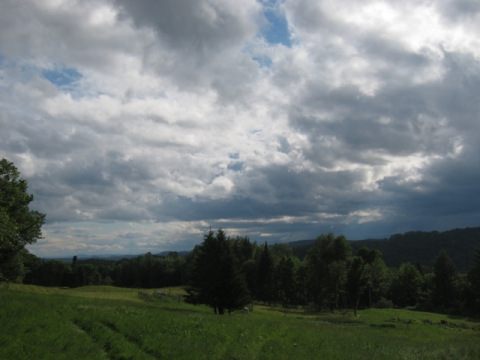
Home, too
The weekend passed the way all summer weekends ought pass. Both mornings, a brief immersion in the pond and then onto the myriad tasks of the day: Repairing the perimeter fence where it was crushed under a wind-tossed balsam fir, our regular Sunday morning firewood session made even more productive by Nate’s participation, more swimming, and the making of 40 or so pounds of lamb sausage, along with (but separate – definitely separate) a dozen or so pounds of beaver sausage, courtesy of Nate’s trapping efforts. Whilst the beaver was being masticated in our grinder, the boys’ woodchuck chili simmered on the stove and there came a moment, as the first long strands of ground beaver splurted from the grinder’s business end, and not long after Fin had come into the house carrying a woodchuck heart and liver in his young hands, that I just had to chuckle at how damn crazy and maladjusted to 21st century norms our family is becoming. I mean seriously, woodchuck chili and beaver sausage? And not just in the same year, or season, or month, or week, but concurrently? Sometimes, I’m afraid to imagine what comes next.
Having Nate around and being privy to the particulars of his life has provoked numerous conversations about money, contentment, what constitutes a meaningful life, and (in some ways most interesting to me) how he might follow his life path in the context of diminished wilderness and the desire for human connection. Because if I think my family is maladjusted to 21st century norms, how must Nate feel? I won’t speak for him, but I will note that in the coming weeks, I plan to interview him for this space. He’s a delightfully grounded and articulate fellow, and I think you’ll enjoy hearing what’s on his mind.
These conversations are provoking a lot of thinking on the part of Penny and myself. Nate’s presence, and the way he lives his life, surrounded by little more than that which he’s made with his own two hands, are reminders of the ways in which even our lives have been hijacked by non-essentials. “We just have so much stuff,” Penny said last night, and she’s right: We do have a lot of stuff. True, we have less than most American families of four, but still… it’s a lot, and most of it to service our infrastructure and enormously high expectations for how how we feed ourselves. It’s hard not to notice that Nate seems perfectly content with meals of beaver sausage and wild nettles, whilst we are forever putting on spreads to rival Thanksgiving at Grandma’s.
Here is what I see: The people in my life who seem the most content – and I do not say “happy” in part because I do not mean “happy,” and in part because I have come to believe that happiness is a rather myopic expression of the full range of human experience, and therefore, not a particularly worthy goal, in-and-of itself – are those who have pared their expectations – and with their expectations, their belongings – to a minimum. I do not think it’s the paring itself that cultivates such contentment, although perhaps that’s part of it. Rather, I believe it is what almost inevitably results from having pared these non-essentials from their lives: Relationships.
Nate’s life is full of relationships. Relationships with people, both those he’s learning from and teaching to, and relationships with the animals that clothe and feed him. And relationships with whatever environment he happens to be in: Yesterday at lunch, he rose and walked to the edge of our pasture, returning with a handful of grasses and sedges, and commenced to explain each in great detail. I’ve lived here for 15 damn years and didn’t know how to identify these plants; he’s been here about 6 weeks.
Broadly speaking, I see how an accumulation of stuff – and in particular, the sort of superfluous industrial supply chain stuff that dominates so many of our lives – erodes these relationships. Pragmatically speaking, these items come to dominate our time, and so as we accumulate, as we develop the infrastructure we think we need to support our assumptions regarding what constitutes a good and meaningful life, we almost inevitably move away from the sort of unmediated relationships that I suspect we all crave, simply because we don’t have the time to develop and maintain those relationships. We may not even realize we’re craving these relationships; we only know we’re craving something, and the tragic irony might just be that we attempt to satisfy those cravings by accumulating more.
How this all relates to my family’s life is something Penny and I are still figuring out. Being debt free and self-employed, we are enormously blessed to have choices that simply aren’t available to many people. And in truth, we may not make very many changes at all: We are contented. We are in love with our days.
On the other hand, someday soon we might just have a really big lawn sale.

June 28, 2013
The Declining Baseline of Personal Choice
Rye “haying” in the kitchen. This was the day after we finished putting up the real thing. The boy can’t get enough.
This whole conversation about health care and health (the former of which sadly does not generally contribute to the latter) has me thinking of a topic that’s been the subject of frequent conversations ’round these parts: Declining baselines.
I was first introduced to the concept via Erik, during my reporting of $AVED. It’s come up again lately thanks to an essay by Derek Jensen in the latest issue of Orion (it’s not on the magazine’s website, so I can’t link to it). In short, declining baseline refers to the phenomenon of adaptation to ever-lower standards. In Jensen’s essay, he refers to the profound loss of wildlife, and the fact that most people alive today don’t even know what’s been lost, since so much of it was lost by the time their frame of reference was even established. That frame of reference – a new normal, so to speak – is a declined baseline.
I think there’s also a declining baseline in regards to our expectations for human health and well being. I think of our own story surrounding money and debt, and how so many of the privileges we have been granted – a piece of land at a price we could afford, for instance, and even the embodiment of the basic skills necessary to build our house – are slowly eroding from our society. Only 15 years ago, we purchased 40 acres – and not just any 40 acres, but 40 really freakin’ nice acres – for $30k. How many young adults have that option today? And on that 40 acres, we built a house with our own four hands and numerous others belonging to friends and family. We never kept careful track of what our place cost to build, but it wasn’t too terrible much more than $50k. Even when adjusted for inflation, these numbers would be tough to match in 2013. Not impossible, perhaps, but tough, and the contemporary expectation that a young family must go 100′s of thousands of dollars into debt simply to put a roof over their heads is a declined baseline.
What of the fact that by 2050, one-third of all adults will have diabetes? Can you imagine how that might have sounded 30 years ago? But now, given that we’re well on our way to that 33% number, it no longer seems so outrageous. Why? Because our baseline has declined. What of the fact that in the comments yesterday, Beth notes that she feels compelled to pay $18k/year for her family’s health insurance coverage at least in part because the law tells her she must? That is the declining baseline of our freedom. Indeed, I even wonder if her apparent anger at folks such as myself and Tonya, who “move to the northeast kingdom in the middle of nowhere and live on the dole” represents a sort of declining baseline of human empathy.
I don’t know. Perhaps I’m wrong about all of this; probably I’m wrong about at least some of it. But I can’t help noticing how it seems increasingly difficult for people to carve out truly rich and meaningful lives in the context of cultural and economic arrangements that seem all but engineered to thwart them. Sure, some of it comes down to personal choice: After all, no one forced Penny and me to live in a tent for two summers, while we saved to by our land. We chose to exchange that inconvenience for at least some of the freedom we currently enjoy. Likewise, no one is forced to assume large mortgages, or drive new cars, or quaff 64-ounce jugs of Mountain Dew for breakfast.
And yet, it’s not hard to see how the quiet pressures to do these very things – celebrated in literally trillions of dollars of advertising and a culture that seems to have adopted them as the norm – might lead folks to believe there simply isn’t another way. After all, what else have they been exposed to? It’s the declining baseline of personal choice, and that might be the damaging of all.

June 27, 2013
Ben Hewitt's Blog
- Ben Hewitt's profile
- 37 followers


